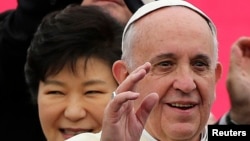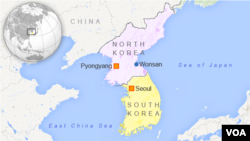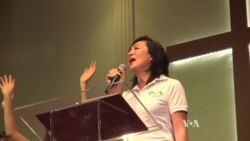Pope Francis said dialogue, and not "fruitless" displays of force, will help bring peace to the Korean peninsula, as he began a five-day visit to South Korea.
Speaking in English - a rarity for the Spanish-speaking pope - Francis said diplomacy is based on dialogue rather than accusations and threats.
"For diplomacy, as [inaudible] as possible, is based on the firm and persevering condition that peace can be won through quiet listening and dialogue, rather than by mutual recriminations, fruitless criticism and displays of force," he said.
And he noted that Korea's "quest for peace" affects the stability of the entire region.
The Pope met with South Korean President Park Geun-hye after arriving in Seoul Thursday, and the two leaders gave a joint address.
Park said North and South Korea should get rid of fear and nuclear weapons and concentrate on reunification.
She thanked the pope for his prayers and for carrying out a mass "for peace and reconciliation" during his visit.
As Pope Francis's plane was landing in Seoul early Thursday, North Korea fired the first of five projectiles into the Sea of Japan.
Seoul defense officials say the projectiles were launched from the port city of Wonsan and traveled 220 kilometers before landing in the ocean off the east coast.
Foreign Ministry spokesman Noh Kwang-il condemned the launches, which are the latest in a series of similar rocket tests by the North.
"The message of the pope’s visit is peace and reconciliation," said Noh. "He came here to deliver messages of blessing to the Koreans both in the South and in the North. But North Korea’s firing of projectiles, and the additional two projectiles, on the day of his arrival is not good. As you know, short-range missiles, or ballistic missiles are a violation of the U.N. Security Council. We view that this reckless provocation must be stopped immediately."
During his trip, Francis will participate in a Catholic youth festival and a mass for peace and reconciliation on the divided and tense Korean peninsula.
The North declined to send a delegation to the papal mass, citing its anger at upcoming U.S.-South Korean military drills.
Like all other religions in North Korea, Catholicism is only allowed to exist under the tightest of restrictions. As a result, it is unclear how many North Koreans practice Catholicism.
The pope's trip to South Korea is also highlighting tensions between the Vatican and China, which do not have diplomatic relations.
As his plane flew over Chinese airspace, Pope Francis sent a message to President Xi Jinping offering "divine blessings of peace and well-being upon the nation."
Despite the Vatican's objections, Beijing insists on maintaining a state-controlled Catholic church, which does not answer to Rome. There is also a large underground church, and the two sides disagree over which has the authority to ordain priests.
About 100 Chinese had planned to attend the Asian Youth Day hosted by the pope. But on Thursday, Heo Young-yeop, a spokesman for the papal visit to Korea, said half of those had been unable to attend.
"Some [Chinese] youths had planned to attend the event could not come due to the complicated situation inside China. The committee feels sorry [for this]," he said.
Chinese officials have not commented on why the youths were unable to attend.
Despite its regional significance, a large part of the pope's trip is expected to focus on South Korea, which boasts about five million Catholics and is one of the church's fastest growing congregations in the world.
His trip is the first since Pope John Paul II visited South Korea in 1989. Vatican officials say Francis will bring a message about the "future of Asia" and speak to all countries on the continent during his trip.
Watch related story by VOA's Jerome Socolovsky:











